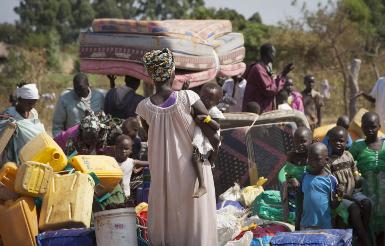Over 70,000 South Sudanese seeking asylum in Uganda
March 14, 2014 (KAMPALA) – Over 70,000 South Sudanese are registered in Uganda as asylum seekers according to office of Ugandan prime minister, with the vast majority believed to have fled the devastating conflict that began in Juba in mid-December and has spread to other parts of the world’s youngest nation.

The UN estimates that there are over 82,000 South Sudanese who have been displaced to Uganda due to the current conflict, which has caused a further 60,000 to flee to Ethiopia, 20,000 to Kenya and almost 40,000 to Sudan.
Over 705,800 people have been displaced within the country, according the United Nations Office for the Coordination of Humanitarian Affairs (OCHA) in South Sudan.
South Sudanese refugees who Sudan Tribune has spoken to express deep fear of returning home after witnessing what they describe as ethnic cleansing.
In old Kampala police station a massive number of South Sudanese walk in everyday to seek for protection under asylum registration, including Broky Ruei and his family who are waiting for the status as asylum seekers to be approved.
Ruei says he fled into Uganda for safety after the alleged coup attempt on December 15 and the violent response by the security services. Human rights groups say that members of the Nuer ethnic group – the same as the South Sudan’s former vice president Riek Machar who denies attempting to seize power – in days after the fighting between soldiers from the presidential guards began.
South Sudan’s government has admitted that over 100 soldiers and security personnel have been arrested in connection with the violence, which triggered mutinies by Nuer commanders in other parts of the country.
Dinka civilians have been targeted in other parts of the country most notably in Bor the capital of Jonglei state, allegedly by forces aligned to Machar, who is now leading a rebellion against the government.
“You see when war broke out on 16 December 2013 in South Sudan, it was not only forcing me move out of South Sudan. I experienced a very terrible situation [in] which I saw my relatives my good friends are dying on the streets and they were humiliated and brutally killed, I have no choice than to run away for my safety”, said Ruei.
Ruei says that South Sudanese who were forced to flee were given no choice.
“It was not my wish in the first place to be a country-less man; it was the situation that forced me to come out from there.”
He said that he would only be able to return if the was “meaningful and true change in South Sudan”.
Douglas Asiimwe a senior protection officer in the department of refugees at Uganda’s Office of Prime Minister (OPM) says the government has set aside free land for refugee settlements in northern Uganda.
“We are settling them land in West Nile, in Adjumani we are working with the local communities and we like to thank so much, the district the local government of Adjumani district and the elder at the community who are availing land voluntarily to government to help in settling South Sudanese and use this land for the time they will be here”, said Asiimwe.
Asiimwe says the urban refugee settlements in towns like Kampala is a challenging problem in terms of providing assistance and identifying them.
“Therefore we provide them with documentation and identification that they are refugee legally in the country”, the refugee protection officer told Sudan Tribune.
Asiimwe said that the presence of so many refugees in Uganda had negative impact on the economic situation and the environment as “people are cutting trees, wood logs and firewood for construction.”
Teak David a South Sudanese in Kampala says he was forced to flee to Uganda to seek safety after a war broke out in his country of South Sudan, adding that it had not been his “intention was not to live in Uganda because there is no place like home”.
David says he would return home if there is a peaceful settlement of the current crisis that has killed an estimated 10,000 people. The main problem of being an asylum seeker is that he is not allowed to work, he said.
South Sudanese need to reject tribalism and stop blaming each other for the position the country is in.
“If I would have a chance to meet those people I will also preach to my people, I will not talk to Dinka you kill Nuer or Nuer you kill Dinka whatever or those tribes are involved, No!”, added David.
Many South Sudanese asylum seekers say that although life in Uganda is good, they stand to loose their jobs if they do not return quickly to South Sudan.
(ST)
